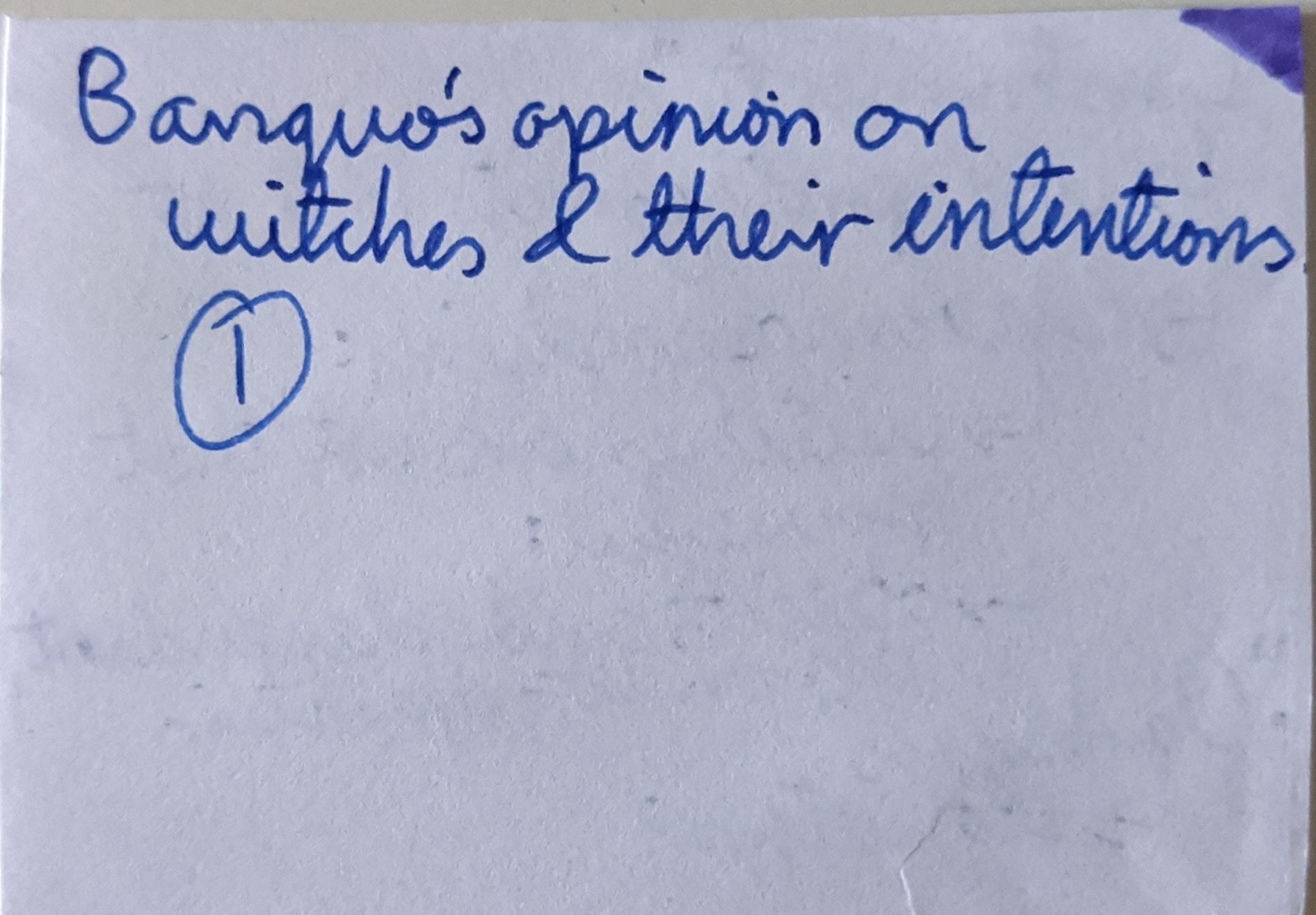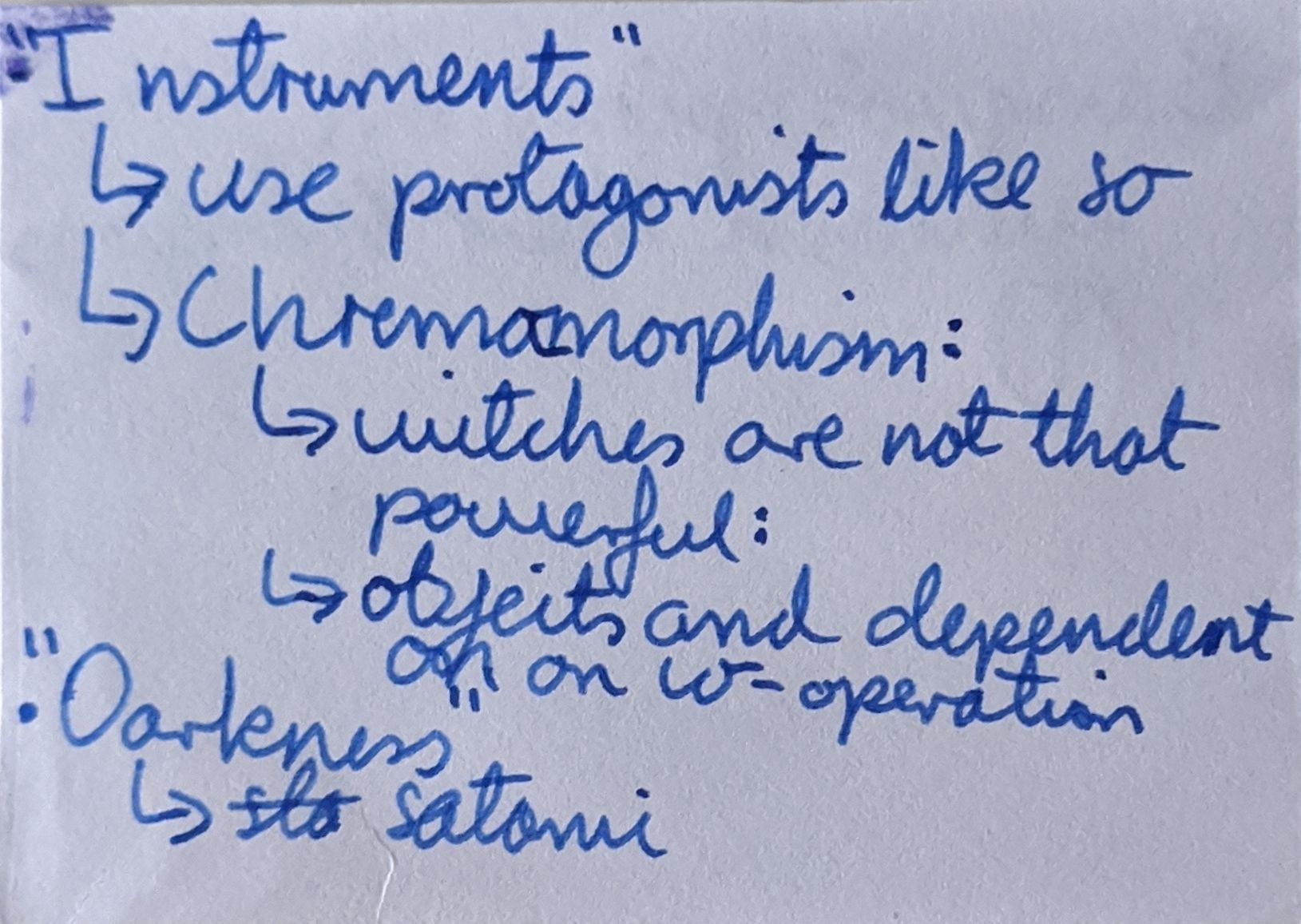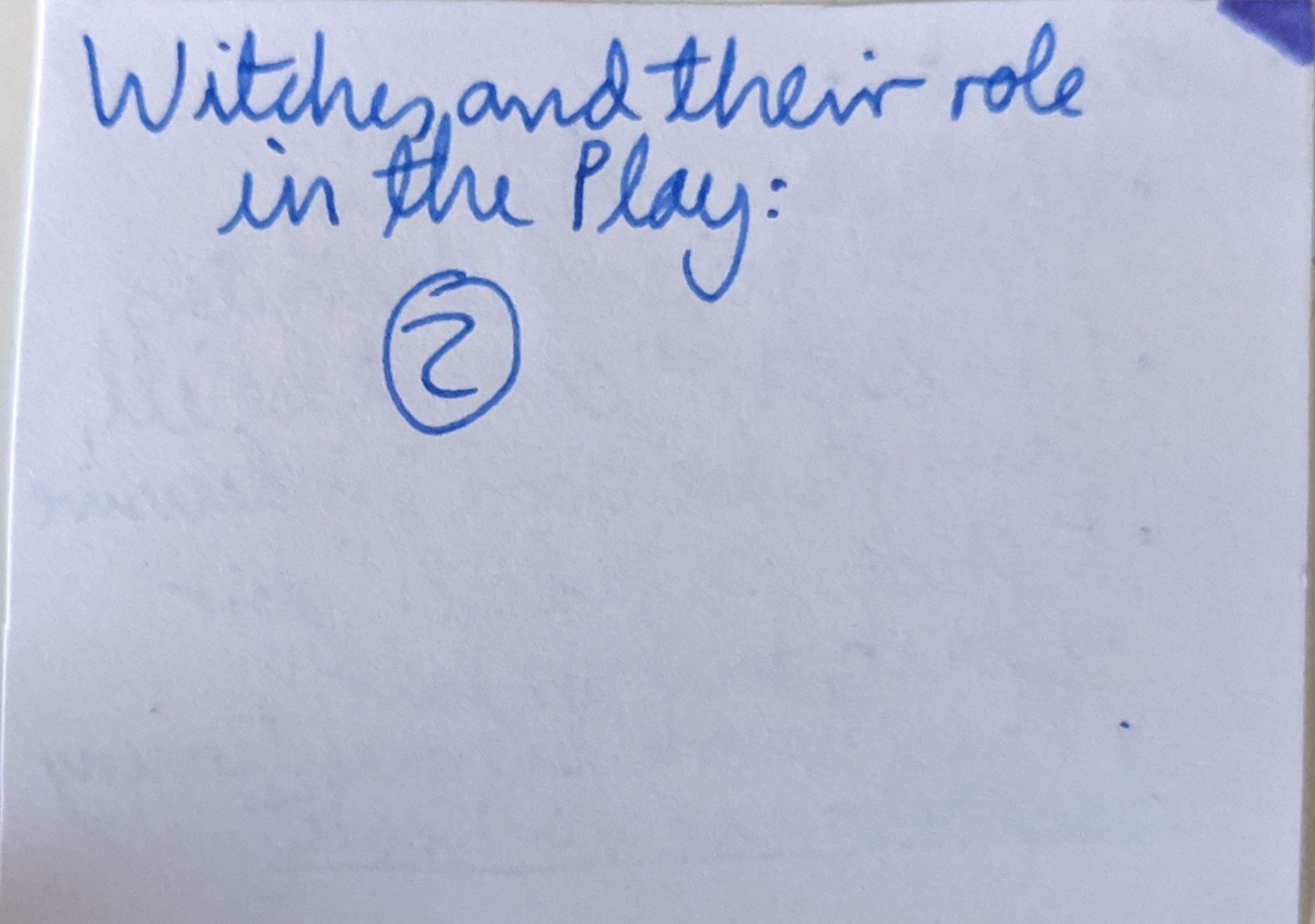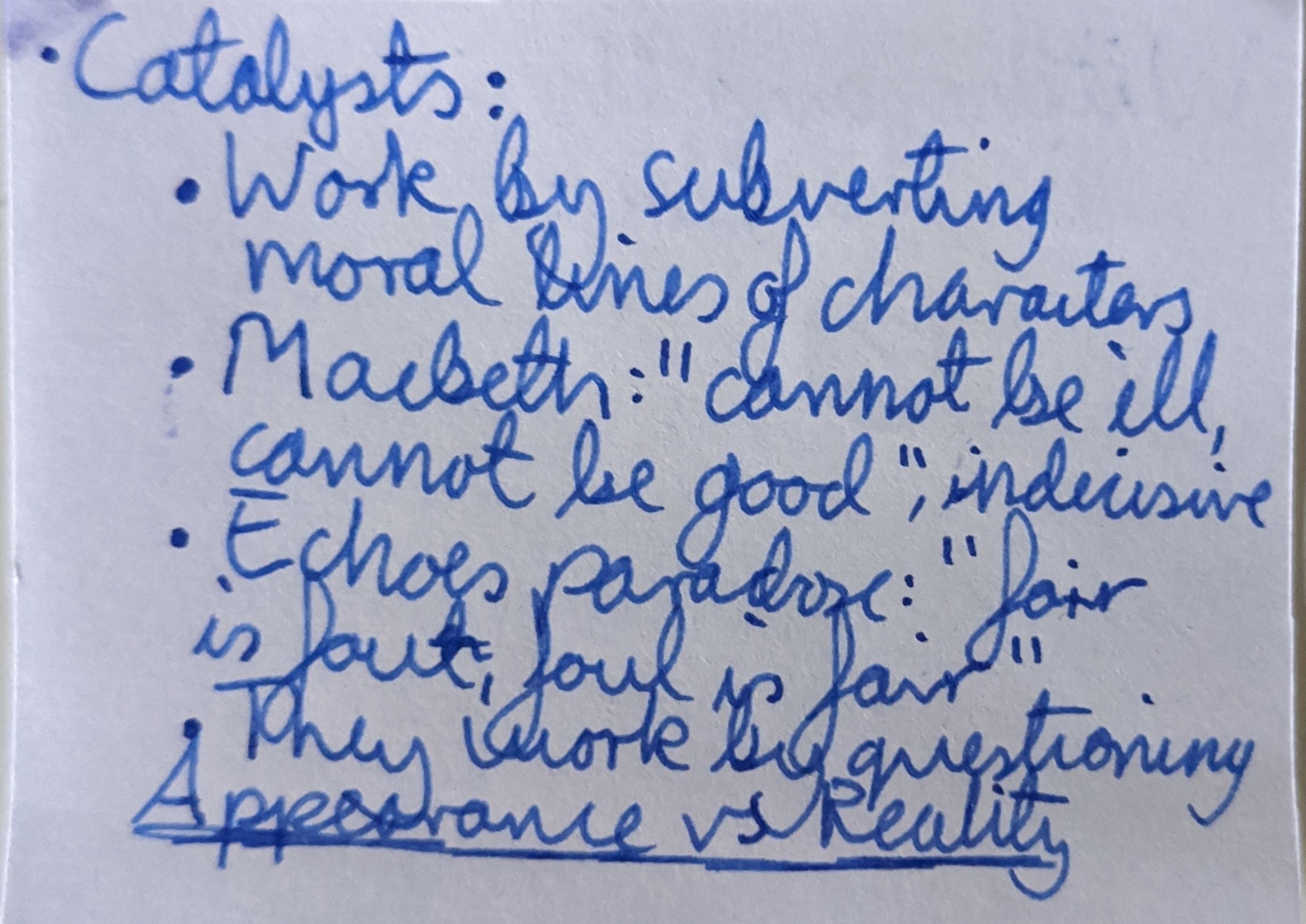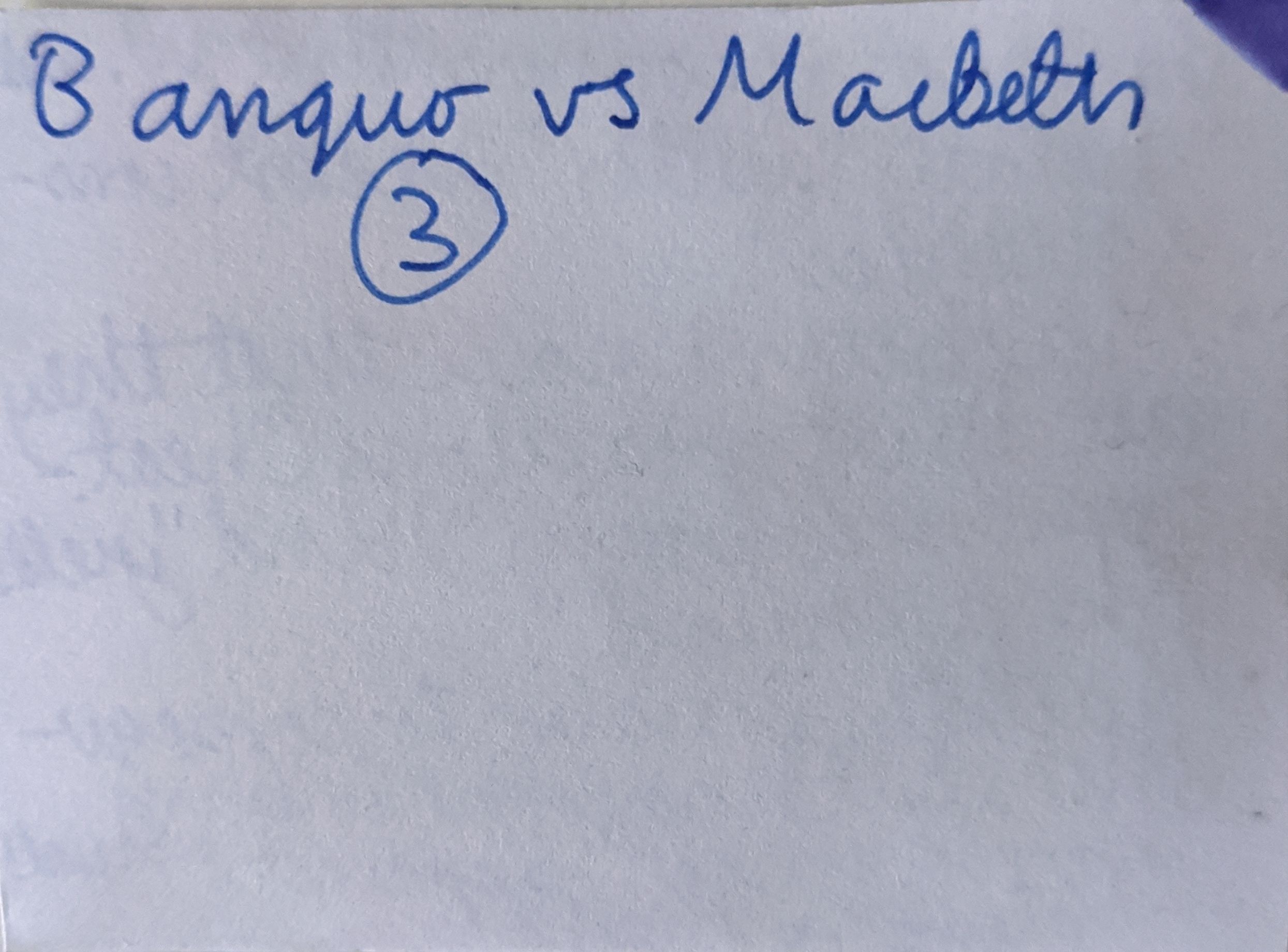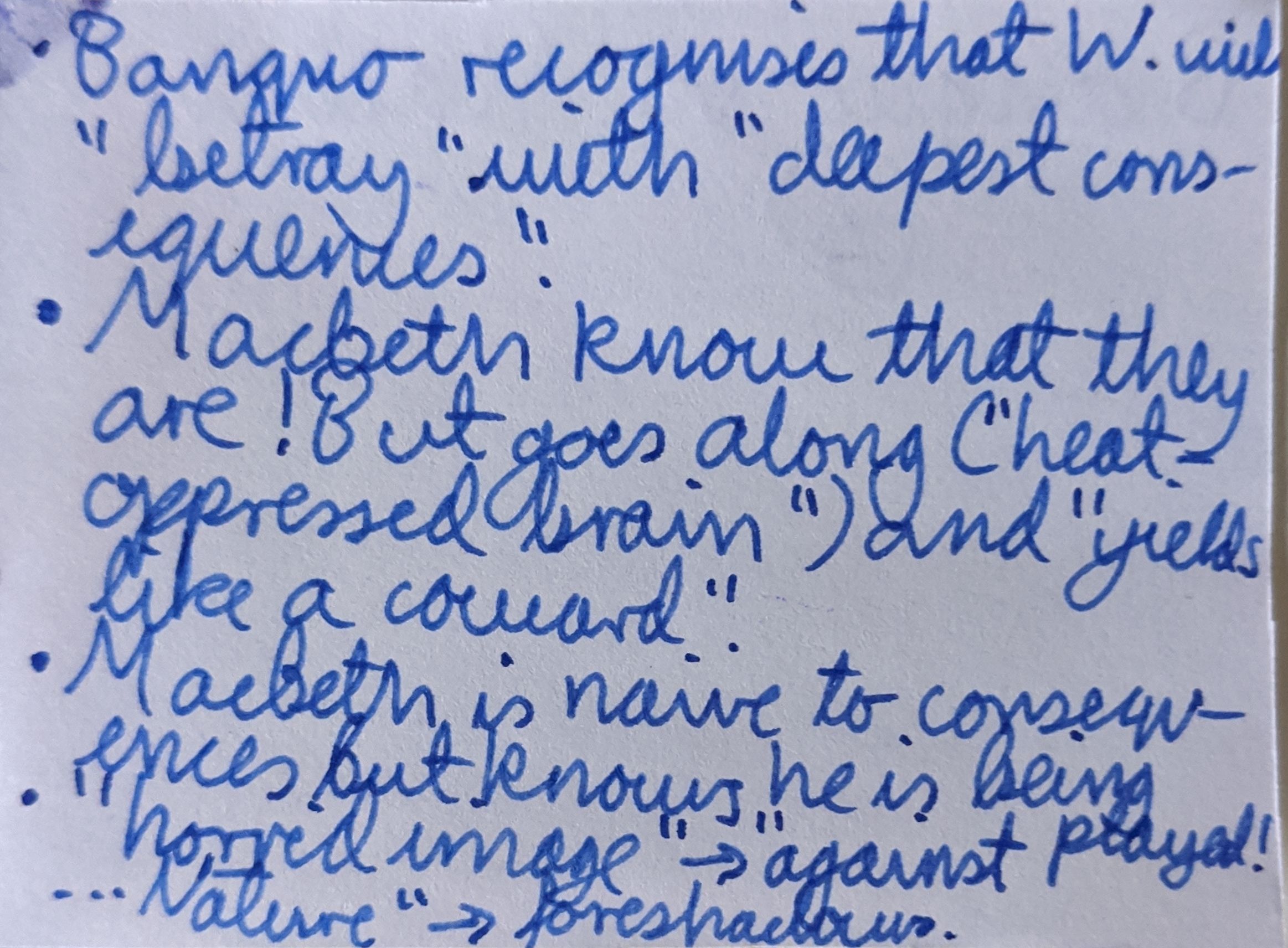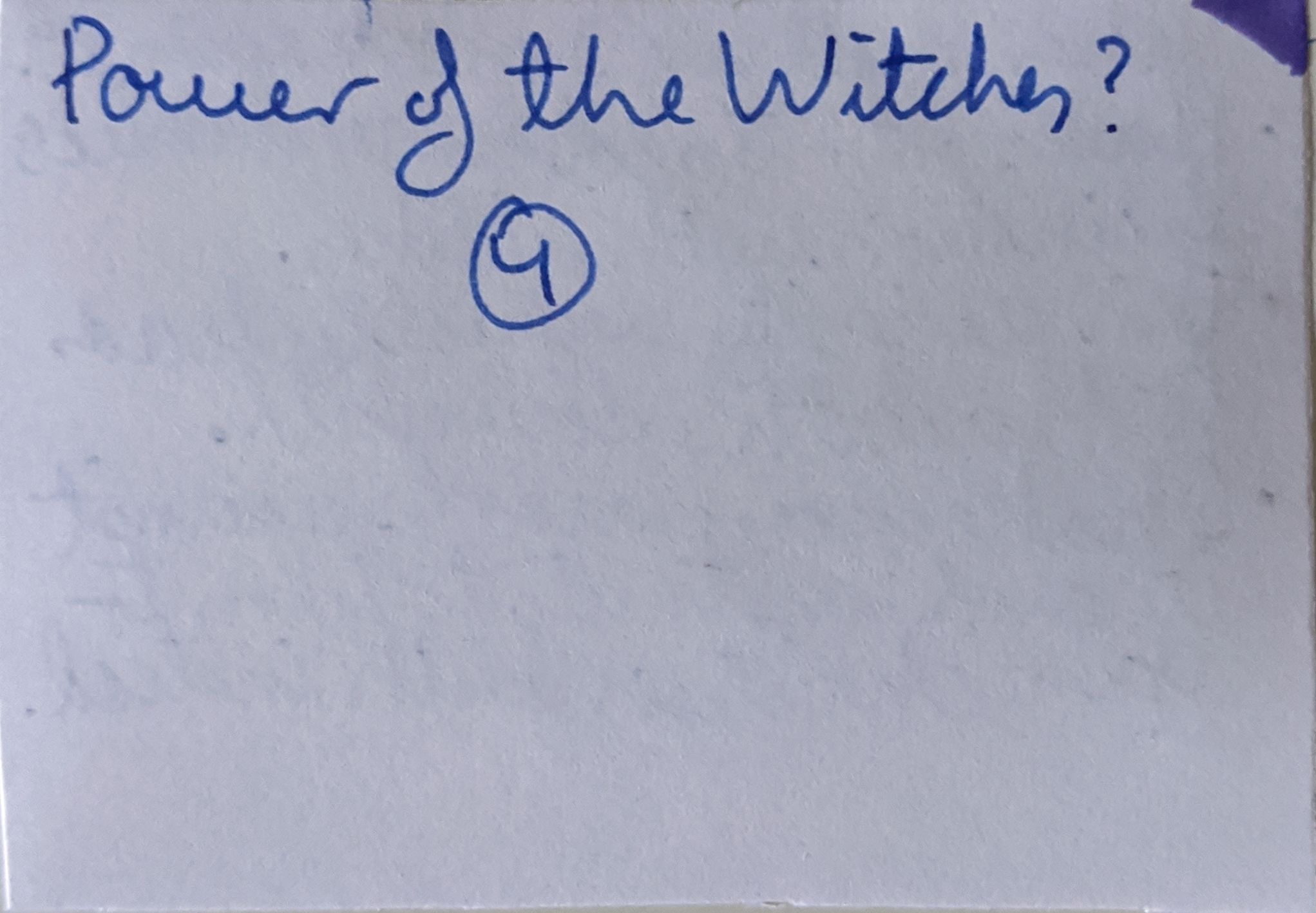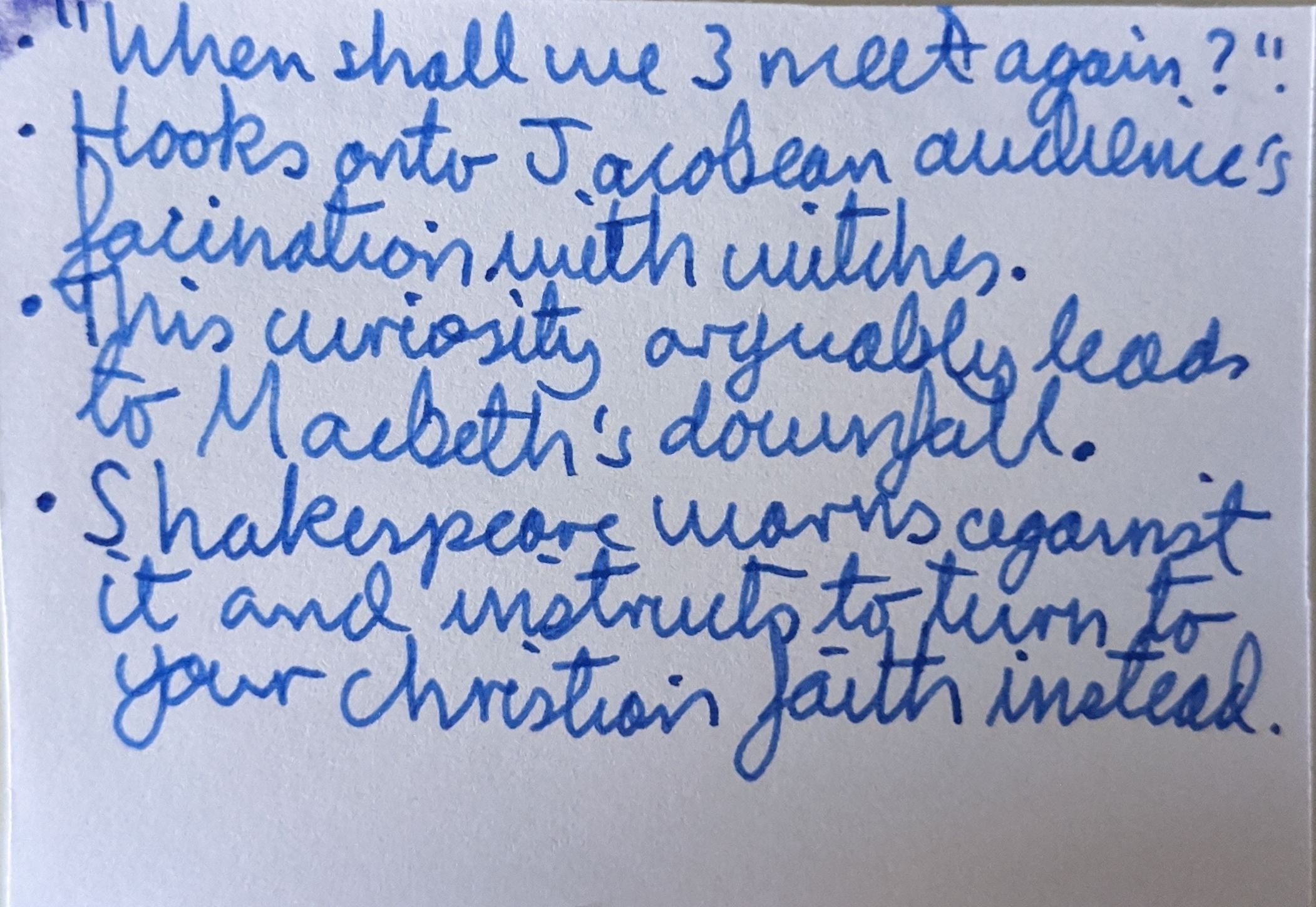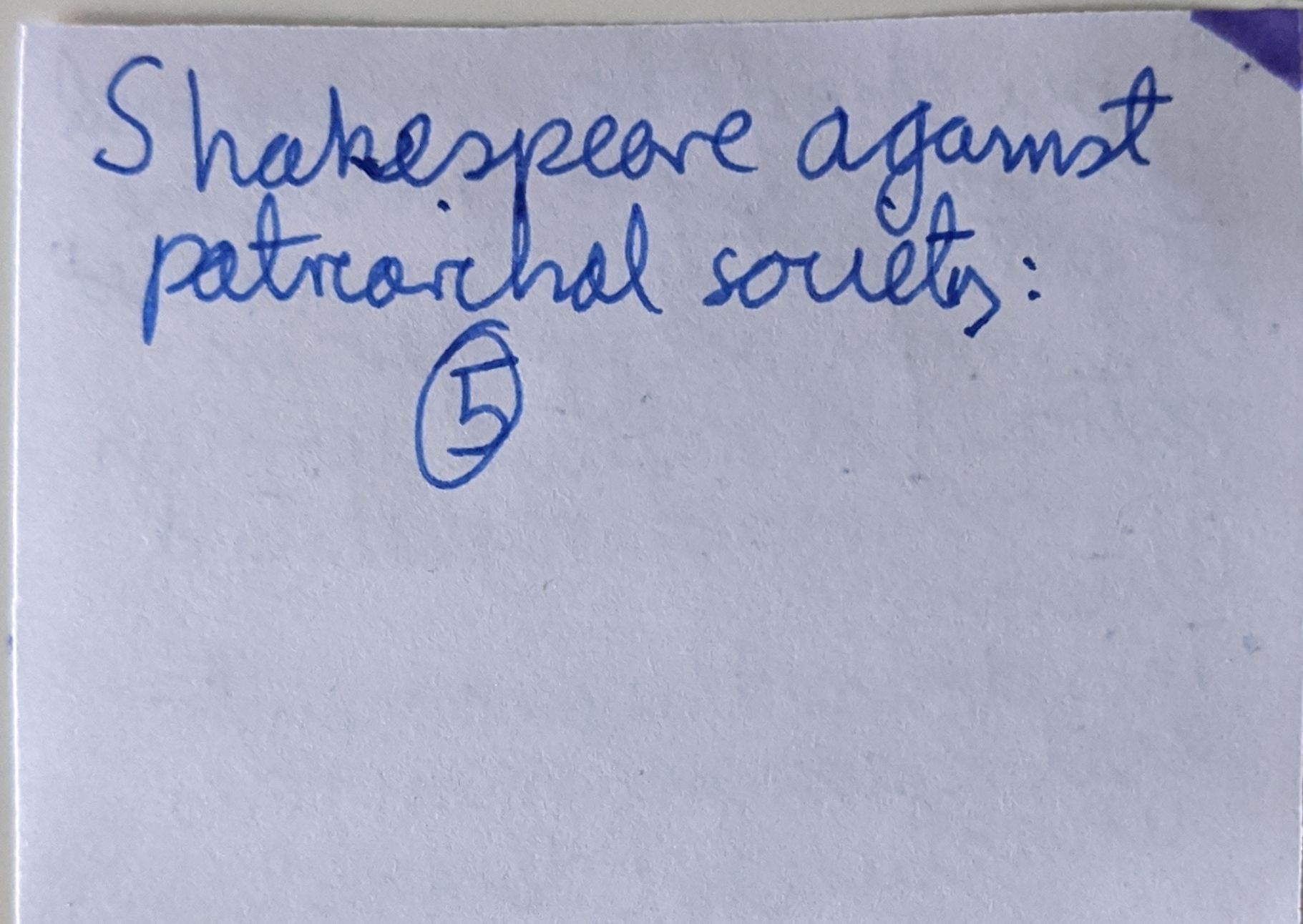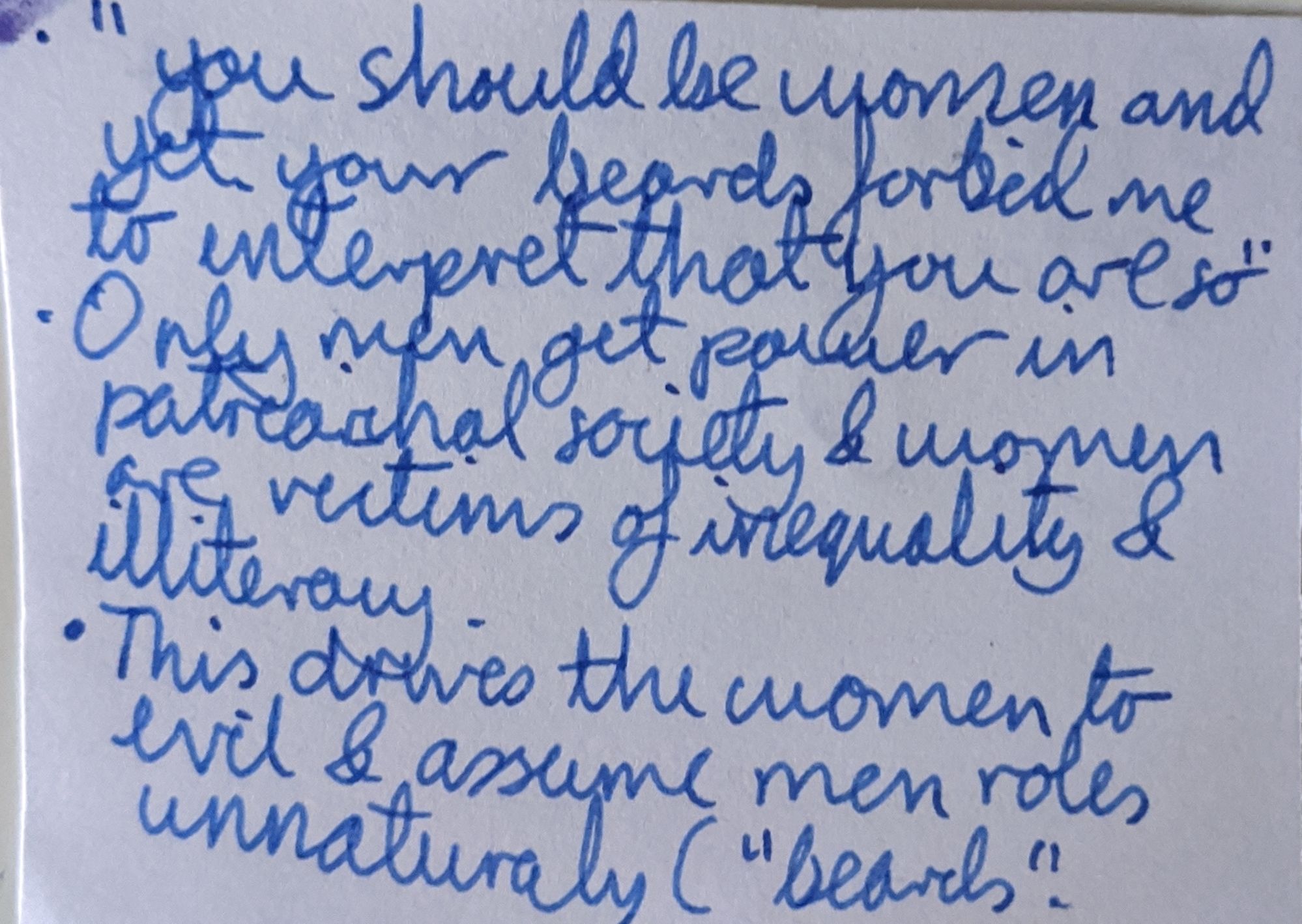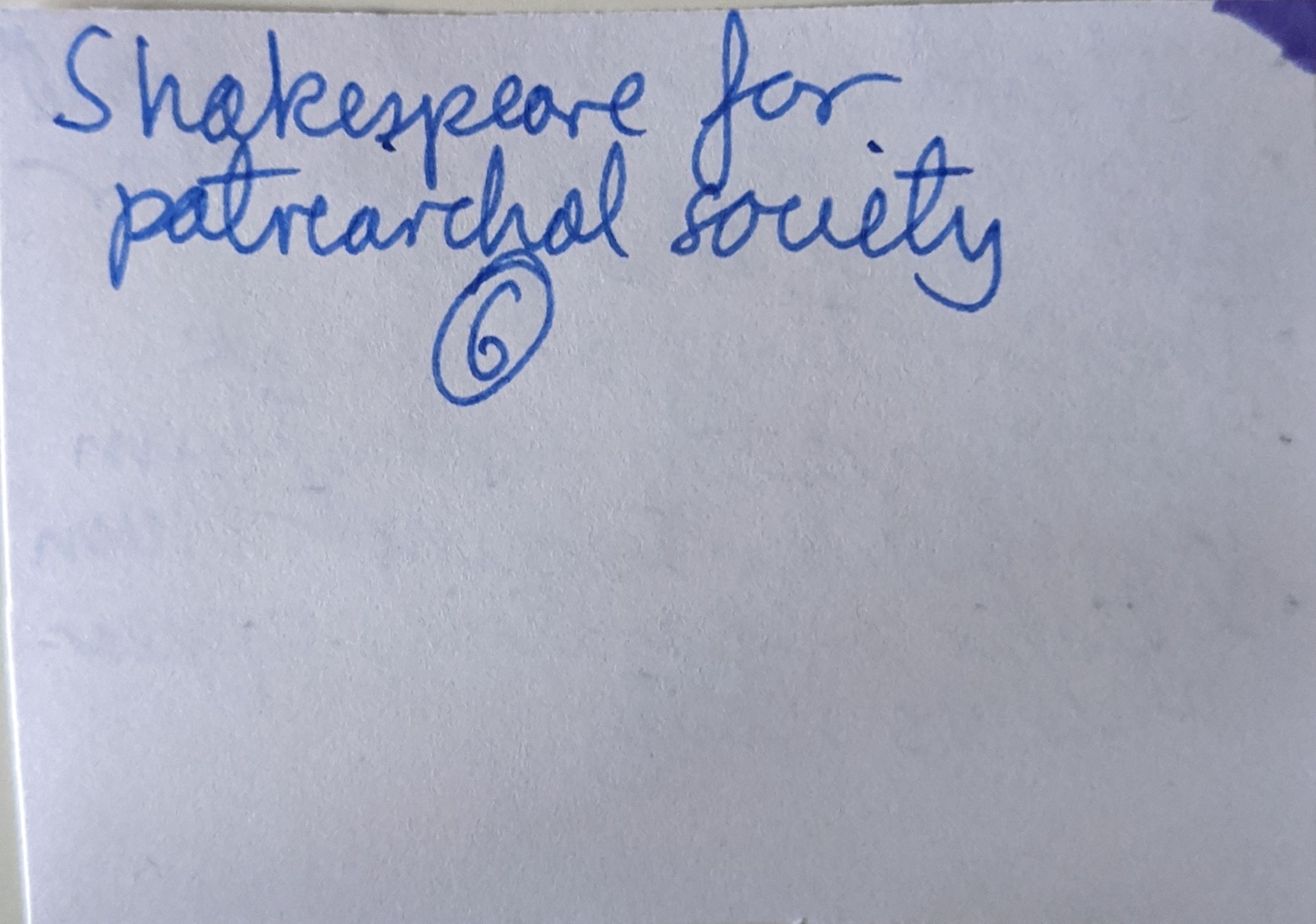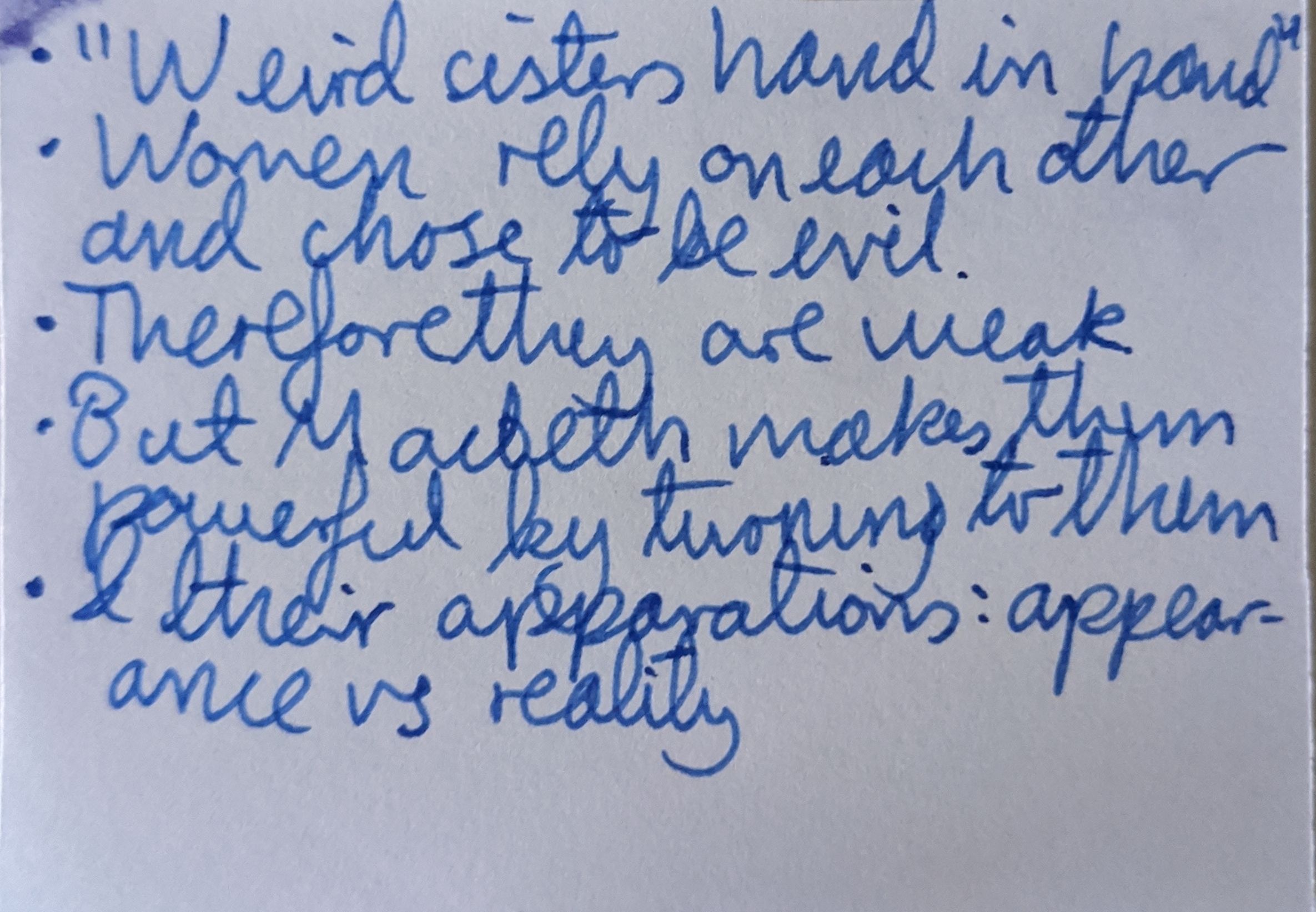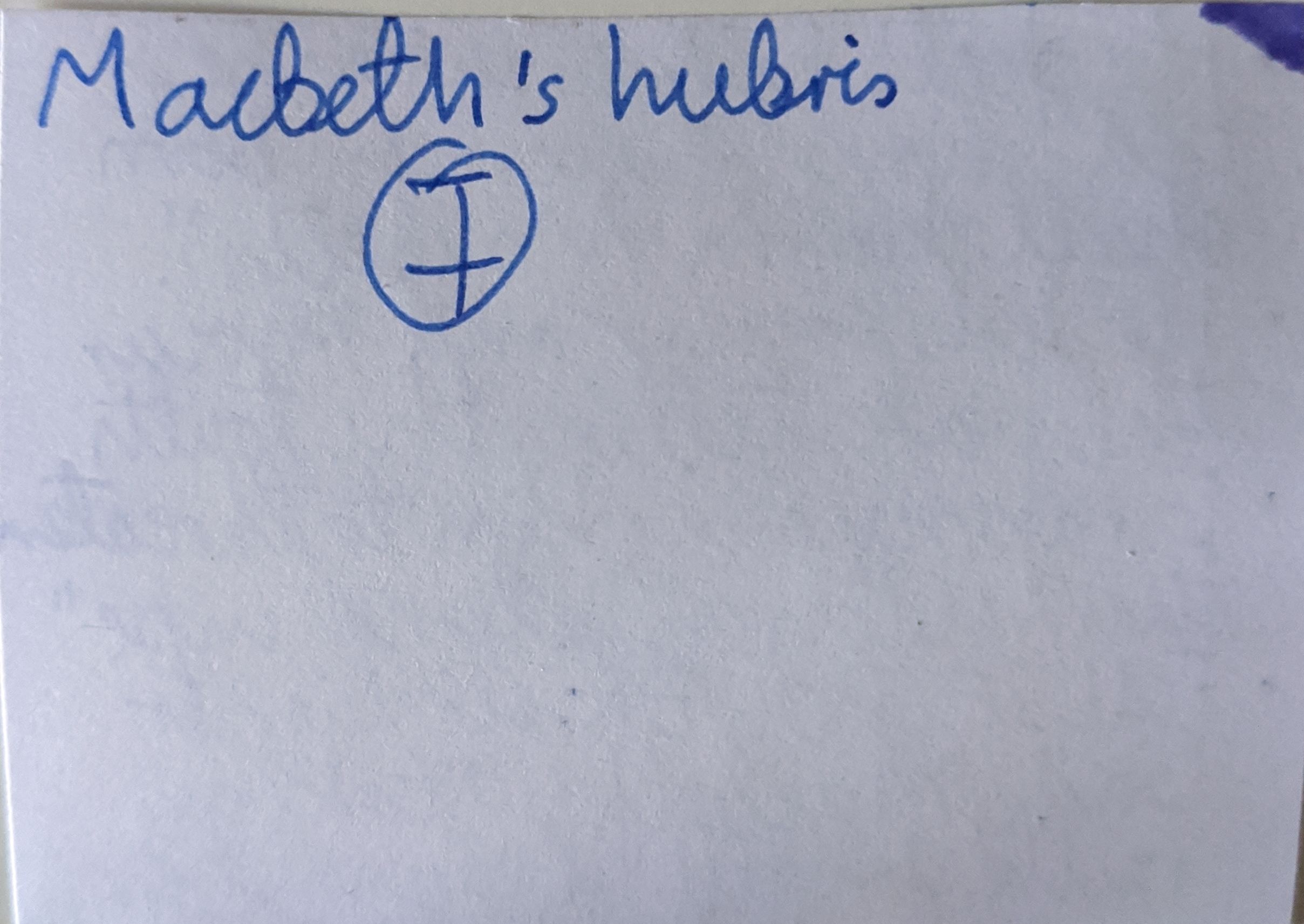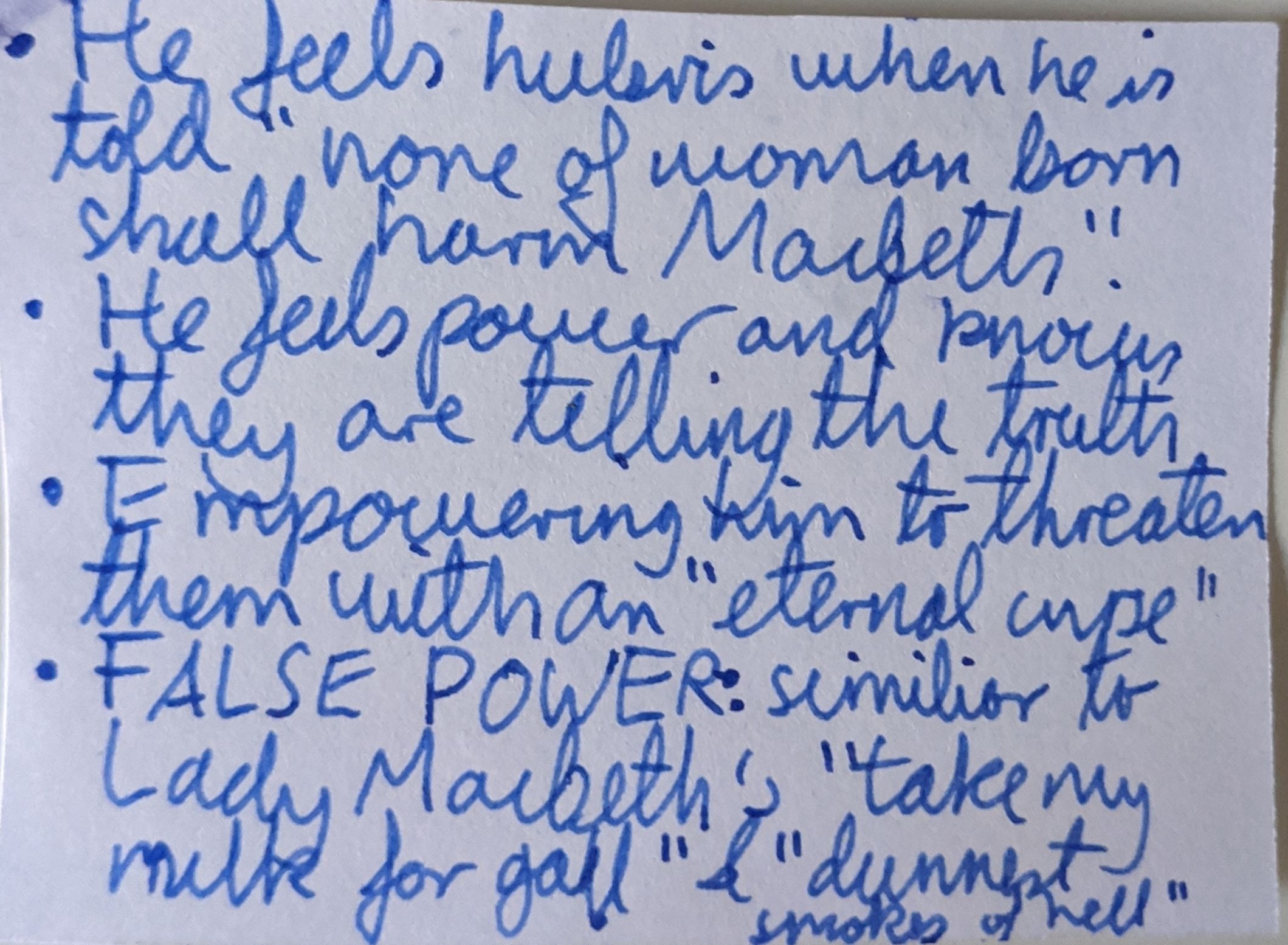Macbeth: The Supernatural
1/33
There's no tags or description
Looks like no tags are added yet.
Name | Mastery | Learn | Test | Matching | Spaced | Call with Kai |
|---|
No analytics yet
Send a link to your students to track their progress
34 Terms
Thesis statement
Flatter King James, his patron
Free will vs Fate
Patriarchal society: forces witches to be evil
in thunder lightning or in Rain
General Analysis: These lines, spoken by the witches, establish their connection to powerful and chaotic natural forces, suggesting they might control the weather. This immediately positions them as something outside the ordinary, hinting at their supernatural abilities and setting a dark and foreboding tone for the play. It also reveals their intention to meet Macbeth, indicating a pre-planned encounter that suggests a degree of foresight or manipulation. OR they could be like the Greek Fates, only able to see the future.
Macbeth: This quote introduces the supernatural element that directly impacts Macbeth's destiny. The fact that the witches know when and where to meet him could be interpreted as fate preordaining his path, or as the witches actively setting events in motion that will appeal to his ambition.
Lady Macbeth: While Lady Macbeth is not present in this scene, the power and mystery of the witches introduced by this quote will later be something she attempts to harness and even surpass in her own quest for power. Her ambition will mirror the disruptive force of the thunder and lightning.
Supernatural: This quote is fundamental to establishing the supernatural as a key force in the play. The witches' association with thunder and lightning signifies their otherworldly nature and hints at a potential control over events that transcends human capabilities.
Why do I yield to that suggestion whose horrid image doth unfixed my hair?
General Analysis: This quote reveals Macbeth's internal conflict even before the witches explicitly suggest he murder Duncan. The "horrid image" that makes his hair stand on end indicates the terrifying nature of the thought, suggesting a pre-existing, perhaps subconscious, ambition or susceptibility to evil. He questions why this thought is arising within him, highlighting his initial moral struggle. The term "suggestion" could be interpreted as an external temptation or an internal inclination.
Macbeth: This quote is crucial for understanding Macbeth's character as it demonstrates a "character flaw" or hamartia existing within him before the witches' direct influence. It suggests that the witches' prophecies may have merely acted as a catalyst for desires already present.
Lady Macbeth: This internal struggle contrasts with Lady Macbeth's later decisive and ruthless ambition. While Macbeth grapples with the morality of the act, Lady Macbeth will actively suppress such doubts in herself and in him, highlighting a key difference in their characters and approaches to achieving their desires.
Supernatural: While the "suggestion" could stem from the witches' earlier pronouncements, this quote focuses on Macbeth's internalisation of the idea rather than direct supernatural intervention. It raises the question of how much the supernatural plants the seed and how much it draws out pre-existing darkness within individuals.
If chance may have me King, why chance may crown me without my stir.
General Analysis: Here, Macbeth considers whether he needs to take any action to become king, suggesting a moment of hesitation and a desire for a bloodless ascension. However, his use of the word "chance" to describe fate is significant. By equating fate with "chance," which implies randomness and uncertainty, he seems to be trying to convince himself that inaction might be risky and that some "stir" might be necessary to ensure the prophecy comes true. This reveals his active mind rationalising a potentially passive approach while simultaneously hinting at his underlying desire to control his destiny.
Macbeth: This quote illustrates Macbeth's attempt to reconcile the witches' prophecy with his own conscience and potential actions. His consideration of waiting for "chance" to crown him reveals a reluctance to actively pursue the crown through violent means, at least initially. This highlights the tension between his desire and his moral reservations.
Lady Macbeth: This initial passivity in Macbeth will be directly challenged by Lady Macbeth, who will actively push him to "stir" and take decisive, violent action. Her influence becomes the "spur" he feels he lacks.
Supernatural: This quote demonstrates Macbeth's interpretation of the supernatural prophecies. He considers "chance" as a potential means to his kingship, which can be seen as his attempt to understand or even manipulate the seemingly predetermined future presented by the witches.
The instruments of Darkness tell us truths… only to betray
General Analysis: Banquo's statement serves as a cautionary remark about the witches and their prophecies. He suggests that these "instruments of Darkness" might offer small truths to gain trust and lure people towards harmful actions. This highlights Banquo's wisdom and moral integrity, contrasting with Macbeth's more immediate acceptance of the witches' words. The phrase "instruments of Darkness" also raises the possibility that the witches are not the ultimate source of evil but rather agents of a greater malevolent force, such as Satan.
Macbeth: Banquo's warning directly addresses Macbeth's situation and the potential danger of trusting the witches. It underscores Macbeth's vulnerability to flattery and his willingness to believe what he wants to hear, contrasting with Banquo's more discerning perspective.
Lady Macbeth: Lady Macbeth, driven by her ambition, is less concerned with the potential deception of evil forces and more focused on seizing the opportunity presented by the prophecies. Banquo's warning highlights the moral path she chooses to ignore.
Supernatural: This quote offers an interpretation of the witches as agents of a darker, potentially satanic, supernatural power. It suggests that their truths are merely a means to a more sinister end, emphasizing the deceptive and dangerous nature of engaging with the supernatural.
You should be women and yet your beards forbid me to interpret that you are so.
General Analysis: Banquo's observation about the witches' beards highlights their unnatural and ambiguous nature. This unusual physical characteristic challenges conventional gender roles and contributes to their otherworldly and unsettling presence. The speaker in the source suggests this could be a form of dark humour, implying that Macbeth might not fully believe in the witches' evil power but recognizes their psychological influence. It is also linked to the patriarchal society where women lacked power unless through marriage or appearance, neither of which the bearded witches possess. The fact that male actors played female roles, including the witches, with full beards, is also a relevant point about the staging and Shakespeare's potential commentary on masculine values and women's lack of power.
Macbeth: Banquo's confusion underscores the uncanny nature of the supernatural beings influencing Macbeth. Their ambiguous appearance adds to their mystique and potential for deception, making them seem less bound by natural laws.
Lady Macbeth: In a patriarchal society where appearance was crucial for women, the witches' beards signify their rejection of conventional femininity and their pursuit of power outside societal norms, potentially mirroring Lady Macbeth's own desire to transcend her perceived limitations as a woman.
Supernatural: The witches' ambiguous gender presentation reinforces their status as supernatural entities that defy natural categories. Their beards make them appear both masculine and female, adding to their unsettling and otherworldly aura.
Is this a dagger which I see before me…
General Analysis: This quote marks the start of Macbeth's hallucination, where he sees a dagger leading him towards Duncan's chamber. The speaker argues that this "imaginary dagger" or "dagger of the mind" is evidence that Macbeth's own desires, rather than supernatural intervention, are driving him to commit murder. Macbeth himself recognises it as a figment of his troubled mind, indicating a self-awareness of his deteriorating sanity, yet his ambition is overpowering. The blood that later appears on the dagger further emphasizes his growing bloodlust and resolve to commit the deed.
Macbeth: This soliloquy is central to understanding Macbeth's internal state and the power of his own ambition and guilt. The imaginary dagger symbolises his descent into madness and the manifestation of his murderous intentions, suggesting that the witches' prophecies have ignited a pre-existing darkness within him.
Lady Macbeth: While not directly present, this scene highlights the outcome of Lady Macbeth's influence. Her goading and manipulation have contributed to Macbeth reaching this point of psychological turmoil and murderous intent.
Supernatural: While some might attribute the dagger to the witches' magic, the speaker argues it is a projection of Macbeth's own mind, thus downplaying direct supernatural intervention at this crucial moment. This interpretation emphasizes Macbeth's personal responsibility for his actions, driven by his internal desires rather than external supernatural forces.
heat-oppressed brain
General Analysis: Spoken during Macbeth’s soliloquy, this phrase reflects a psyche under siege. “Heat-oppressed brain” suggests a mind fevered by stress, moral turmoil, and unchecked ambition. The metaphorical “heat” raises the question of its source: is it external manipulation, supernatural influence, or internal desire? The hallucinated dagger may be less a mystical omen than a projection of Macbeth’s fracturing mind, consumed by anticipation and dread. Alternatively, it could symbolise fate’s intervention, with Macbeth’s agitated consciousness serving as its conduit.
Macbeth: The phrase marks a pivotal fracture in Macbeth’s mental stability. His ambition ignites an internal inferno, obscuring reason and distorting perception. That he questions the dagger’s reality reveals his disorientation and vulnerability—ambition has begun to overwhelm his conscience, setting his tragic arc in motion.
Lady Macbeth: Though absent in this scene, Lady Macbeth’s influence permeates it. Her earlier scorn—particularly her assaults on his masculinity—contributes significantly to this “heat.” Her manipulative rhetoric corrodes Macbeth’s resolve, compounding his anxiety and accelerating his descent into delusion.
Supernatural: The witches’ prophecy planted the seed, but whether the vision is conjured by dark forces or by Macbeth’s mind remains ambiguous. While a supernatural reading is possible, the phrase “heat-oppressed brain” leans toward a psychological explanation—his mind, overwrought by ambition and guilt, conjures the dagger as both symbol and symptom of inner collapse.
Thou canst not say I did it.
General Analysis: Macbeth's outburst upon seeing Banquo's ghost at the banquet reveals his profound guilt and his disturbed mental state. The speaker suggests that the ghost is a manifestation of Macbeth's own mind, rather than a supernatural apparition orchestrated by the witches. Another interpretation is that it is fate intervening because Macbeth attempted to alter the prophecy regarding Banquo's descendants by having him murdered. Macbeth's focus on the bloody appearance of the ghost ("never shake thy gory locks at me") is also interpreted as a potential subconscious confession to the assembled nobles that he murdered Duncan, as they are unaware of Banquo's death and would assume his distress relates to the former king.
Macbeth: This scene is a key moment in Macbeth's downfall, illustrating the psychological consequences of his actions and his inability to escape his guilt. The appearance of Banquo's ghost torments him, revealing the fragility of his mental state and his growing paranoia.
Lady Macbeth: Lady Macbeth attempts to rationalise Macbeth's behaviour as a recurring fit, showcasing her quick thinking and her continued efforts to protect him and their position, even as his mental state deteriorates. However, this event marks a shift as Macbeth increasingly isolates himself and his guilt becomes more apparent.
Supernatural: While the ghost could be seen as a supernatural manifestation, the speaker leans towards the interpretation that it is a product of Macbeth's guilt-ridden mind or the intervention of fate, thus again questioning the direct manipulative power of the witches. The alternative interpretation of fate intervening suggests a larger cosmic order reacting to Macbeth's defiance of the prophecies.
By the pricking of my thumbs, something wicked this way comes.
General Analysis: This line from the witches indicates their recognition of Macbeth's inherent wickedness. They sense his approach not merely as a powerful man but as a morally corrupt one. This contrasts with Lady Macbeth's earlier perception of him as being "full of the milk of human kindness". The witches' awareness of his evil reinforces the idea that they are drawn to and engage with those who already possess a capacity for darkness.
Macbeth: This quote highlights that Macbeth's wickedness is evident even to the supernatural beings. It suggests that the witches are not corrupting an innocent man but rather interacting with someone already inclined towards evil, as indicated by their immediate recognition of his "wicked" nature.
Lady Macbeth: This contrasts sharply with Lady Macbeth's initial view of Macbeth's character, highlighting her misjudgment of his true nature and perhaps her own underestimation of the depths of evil.
Supernatural: This quote reinforces the witches' role as detectors or sensors of evil. Their supernatural senses allow them to perceive Macbeth's inherent wickedness, suggesting they are not simply manipulators but also beings attuned to the moral landscape of the play.
None of woman born shall harm Macbeth.
General Analysis: This prophecy is presented as a crucial riddle that deceives Macbeth and provides him with false confidence. The speaker points out the ambiguity of the statement and how the witches are toying with Macbeth. While it seems impossible to circumvent being born of a woman, the prophecy is ultimately fulfilled by Macduff, who was delivered via Caesarean section ("from his mother's womb untimely ripped"). The speaker emphasises that at this stage, Macbeth is already on a path of violence and desperation, and the witches are merely manipulating his hopes rather than causing him to act differently.
Macbeth: This prophecy becomes a cornerstone of Macbeth's hubris and his false sense of invincibility. His reliance on this seemingly impossible condition leads him to underestimate his enemies and disregard warnings, ultimately contributing to his downfall.
Lady Macbeth: This prophecy indirectly affects Lady Macbeth by contributing to Macbeth's overconfidence. As he feels increasingly secure due to the witches' words, he may become less reliant on her counsel, as suggested by him not confiding in her about Banquo's murder.
Supernatural: This is a prime example of the supernatural using ambiguous language and riddles to mislead and manipulate mortals, a common trope in Greek tragedy which influences Shakespeare. The witches' prophecy appears protective but ultimately leads to Macbeth's destruction, highlighting the deceptive nature of supernatural pronouncements.
Beware Macduff.
General Analysis: While presented as a warning, the speaker argues that by the time the witches say this, Macbeth has already made his destructive choices, including the decision to kill Macduff's family. The speaker suggests that heeding this warning might actually have been in Macbeth's best interest, as his decision to murder Macduff's family only gave Macduff a greater motive for revenge. Therefore, the witches' pronouncements are not necessarily driving his actions but rather highlighting potential threats he chooses to escalate.
Macbeth: This warning, while seemingly straightforward, highlights Macbeth's increasingly paranoid state. Despite the warning, his subsequent actions against Macduff's family are his own, demonstrating his descent into indiscriminate violence and his failure to heed even the advice that might have saved him.
Lady Macbeth: The consequences of Macbeth's decision to disregard this implicit advice, by murdering Macduff's family, ultimately contribute to the unbearable guilt that leads to Lady Macbeth's madness and death.
Supernatural: This prophecy, like the others, has a supernatural origin. However, the speaker emphasizes that Macbeth's reaction to it and his subsequent choices are driven by his own will and flawed judgment, rather than direct supernatural compulsion.
Tomorrow, and tomorrow, and tomorrow
General Analysis: This soliloquy is a pivotal moment that reveals Macbeth's profound despair and his nihilistic view of life following the death of Lady Macbeth. The repetition of "tomorrow" emphasises the bleak monotony and perceived meaninglessness of time stretching ahead. The speaker argues that Macbeth's reaction demonstrates the depth of his love for Lady Macbeth, as her death leaves his life devoid of purpose.
Macbeth: This soliloquy showcases Macbeth's complete disillusionment and the ultimate consequences of his actions. Having achieved his ambition, the loss of his "dearest partner of greatness" leaves him with a sense of utter futility. It reveals the emptiness of his kingship and his profound regret, though not necessarily for the murders themselves, but for the meaninglessness his life has become.
Lady Macbeth: This soliloquy is directly triggered by the news of Lady Macbeth's death, highlighting the profound impact she had on Macbeth's life and ambition. His use of language ("Out, out, brief candle") that echoes her earlier despair ("Out, damned spot!") underscores their deep connection and shared descent into despair.
Supernatural: While the witches' prophecies set the initial course of events, this soliloquy reflects Macbeth's ultimate understanding of the insignificance of life, a perspective born from his own choices and their tragic consequences, rather than a direct supernatural influence at this stage. He laments the meaninglessness, not specifically blaming the supernatural, but questioning the very nature of existence.
Out, out, brief candle
General Analysis: This metaphor compares life to a candle that is quickly extinguished, emphasizing its brevity and fragility. It echoes Lady Macbeth's despair in the sleepwalking scene ("Out, damned spot!"), highlighting a shared sense of the futility and transience of life and their actions.
Macbeth: This phrase reveals Macbeth's bleak outlook on life, seeing it as short and easily, now that his ambition has been realised and his wife is gone. It underscores his despair and the emptiness of his victory.
Lady Macbeth: The echo of Lady Macbeth's words connects their fates and suggests a shared understanding of the ultimate meaninglessness of their actions and the brevity of life's triumphs.
Supernatural: While the supernatural set the stage for the tragedy, this phrase reflects Macbeth's personal philosophical reflection on the nature of existence, a consequence of his choices rather than a direct supernatural manipulation at this point.
Poor player
General Analysis: This metaphor compares Macbeth to a bad actor on a stage, suggesting he feels insignificant and unskilled in the grand scheme of life. The speaker also notes the Jacobean-era meaning of "shadow" as "understudy," implying Macbeth is not a legitimate king, merely filling Duncan's role poorly.
Macbeth: This reveals Macbeth's self-perception as an inadequate and ultimately replaceable figure, someone who has taken on a role he is not fit for. It highlights his recognition of his illegitimacy as king and the futility of his efforts.
Lady Macbeth: This perspective contrasts with Lady Macbeth's initial ambition to elevate their status and become queen. Macbeth's feeling like a "poor player" underscores the ultimate failure of their shared aspirations.
Supernatural: This metaphor suggests Macbeth's sense of being a pawn in a larger, perhaps meaningless, drama, although he attributes the writing of this "script" to an "idiot," possibly God or fate, rather than directly blaming the witches at this point.
Walking shadow
General Analysis: This metaphor portrays life as something fleeting and without substance, like a shadow that cannot be grasped. As noted previously, "shadow" also had the meaning of "understudy" in Shakespeare's time, further emphasizing Macbeth's sense of illegitimacy as king.
Macbeth: This image reinforces Macbeth's feeling that his life and kingship are ultimately unreal and without lasting significance. It highlights the emptiness he feels despite achieving his ambition.
Lady Macbeth: This sense of insubstantiality contrasts with the tangible power and status Lady Macbeth initially sought. Macbeth's view reflects the ultimate hollowness of their gains.
Supernatural: This metaphor contributes to Macbeth's overall sense of a predetermined and ultimately meaningless existence, a feeling that arises from the tragic consequences of his engagement with the supernatural prophecies and his own actions.
Tale told by an idiot
General Analysis: This metaphor expresses Macbeth's ultimate belief that life is pointless and meaningless, full of sound and fury but ultimately signifying nothing. The speaker suggests that Macbeth might even be blaming God or fate for his predetermined destiny. This statement also reveals his denial of personal responsibility for his actions, attributing them to a meaningless script written by an "idiot".
Macbeth: This is the culmination of Macbeth's despair and his complete rejection of any inherent meaning in life. It reflects his profound disillusionment and his attempt to absolve himself of responsibility for his choices by viewing himself as a mere character in a senseless story.
Lady Macbeth: This bleak view of life stands in stark contrast to Lady Macbeth's initial drive and ambition to seize control of their destiny. Macbeth's utter despair highlights the catastrophic consequences of their actions.
Supernatural: While not directly blaming the witches, this quote reveals Macbeth's profound questioning of the forces that have shaped his life and led him to this point of utter despair. His sense of a meaningless "tale" could be interpreted as a reaction to the deceptive nature of the prophecies and the tragic unfolding of events.
I have forgot the taste of fears
General Analysis: This quote shows Macbeth's emotional numbness and his loss of the ability to feel fear. The speaker attributes this state to his own violent actions rather than the direct influence of the witches. Having committed so many atrocities, he has become desensitized to feelings that once governed him.
Macbeth: This demonstrates Macbeth's descent into a state of emotional detachment as a consequence of his tyrannical reign and the constant violence he has perpetrated. He has become so accustomed to horror that he no longer experiences fear, a sign of his moral and psychological decay.
Lady Macbeth: This emotional detachment contrasts with Lady Macbeth's increasing descent into guilt and madness, where fear and regret become overwhelming. Their emotional journeys diverge as Macbeth becomes numb and she becomes increasingly tormented.
Supernatural: While the witches' prophecies initiated Macbeth's path, this quote reflects a psychological consequence of his own choices and actions, rather than a state directly inflicted by supernatural means. His loss of fear is a product of his engagement with evil, not a magical spell cast by the witches.
What's he that was not born of woman? Such a one am I to fear.
General Analysis: This quote reveals Macbeth's continued reliance on and belief in the witches' prophecies, even as he faces imminent defeat. He actively seeks to understand the riddle, clinging to the seemingly impossible condition as a last vestige of hope. This highlights the powerful psychological hold the prophecies have had on him.
Macbeth: This demonstrates Macbeth's fatal flaw of trusting in the ambiguous pronouncements of the supernatural. Despite the evidence of his impending doom, he remains fixated on the literal interpretation of the prophecy, showcasing his hubris and his inability to learn from experience.
Lady Macbeth: Lady Macbeth is no longer a significant factor at this stage, but Macbeth's continued reliance on the witches highlights the path he chose, partly influenced by her initial ambition, that has led to their ultimate destruction.
Supernatural: This quote underscores the enduring power of the witches' prophecies over Macbeth's mind. Even in his final moments, he is still trying to solve their riddle, demonstrating the effectiveness of their manipulation and the tragic consequences of his belief in their words.
Unseamed him from the nave to the chops
General Analysis: This graphic description of Macbeth's brutal violence at the beginning of the play establishes his capacity for extreme brutality. The speaker suggests that this inherent violence is why the witches might have targeted him, recognising his potential for ruthless action.
Macbeth: This quote is crucial for understanding Macbeth's character as inherently capable of violence even before the witches' influence. It suggests that the witches tapped into a pre-existing trait rather than implanting a completely alien one. This early display of brutality foreshadows his later tyrannical actions.
Lady Macbeth: While not directly involved in this act of violence, this description of Macbeth's nature helps to explain her initial assessment of him as someone capable of great ambition, albeit needing encouragement to act upon it.
Supernatural: The witches' attraction to Macbeth, as suggested by this quote, implies that the supernatural forces in the play are drawn to existing darkness and violence. They identify and exploit individuals who already possess the capacity for evil.
My dearest partner of greatness
General Analysis: This quote from Macbeth's letter to Lady Macbeth reveals an unusual (for the patriarchal context of the time) level of equality and partnership in their relationship. It highlights Macbeth's recognition of Lady Macbeth's ambition and her significant influence over him.
Macbeth: This reveals the deep bond and shared ambition between Macbeth and Lady Macbeth at the beginning of the play. It underscores her importance in his initial decision-making and his perception of her as an equal in their quest for power.
Lady Macbeth: This address highlights Lady Macbeth's powerful influence over Macbeth and his recognition of her ambition and potential. It sets the stage for their collaborative, albeit morally corrupt, pursuit of greatness.
Supernatural: While not directly referencing the supernatural, this quote shows the dynamic between Macbeth and Lady Macbeth, the two individuals most influenced by the witches' prophecies. Their partnership amplifies the impact of the supernatural on their lives.
Pour my spirits in thine ear
General Analysis: This quote reveals Lady Macbeth's plan to verbally manipulate Macbeth and instill her own ruthless ambition in him. It contrasts with the more subtle and suggestive approach of the witches.
Macbeth: This highlights Lady Macbeth's active role in driving Macbeth towards regicide. She recognises his ambition but believes he lacks the ruthlessness to act upon it, and she intends to provide the necessary "spirits" (courage, resolve) through her words.
Lady Macbeth: This is a key quote for understanding Lady Macbeth's character as a manipulative and ambitious woman who actively seeks to control her husband and their destiny. It showcases her determination to overcome perceived weaknesses in Macbeth's resolve.
Supernatural: This quote illustrates a form of human manipulation that mirrors, but is distinct from, the supernatural influence of the witches. While the witches plant seeds of ambition, Lady Macbeth actively cultivates them in Macbeth's mind through her forceful words.
Come to my woman's breasts, and take my milk for gall
General Analysis: Lady Macbeth's chilling invocation reveals her desire to shed her feminine compassion and embrace cruelty. The image of replacing nurturing "milk" with bitter "gall" signifies her rejection of her natural female instincts and her embrace of ruthless ambition. The mention of lactating suggests the recent loss of a child, potentially fueling her desire for power as a substitute for maternal fulfillment.
Macbeth: This highlights the dark influence Lady Macbeth exerts over herself and implicitly over Macbeth. Her desire to become devoid of feminine weakness aligns with her ambition for him to be equally ruthless.
Lady Macbeth: This quote is central to understanding Lady Macbeth's ambition and her willingness to renounce her femininity in pursuit of power. It reveals the depth of her desire and her embrace of evil as a means to achieve her goals.
Supernatural: This is a direct invocation of supernatural forces, though not the witches themselves. Lady Macbeth seeks the aid of "murdering ministers," indicating her alignment with a dark, potentially demonic, realm to achieve her ambitions.
The Thane of Fife had a wife. Where is she now?
General Analysis: This fragmented utterance from Lady Macbeth's sleepwalking scene reflects her overwhelming guilt and the psychological consequences of their actions, particularly the murder of Macduff's innocent wife. It reveals the lingering impact of the violence they have unleashed and her inability to escape her conscience.
Macbeth: This scene and quote highlight the indirect consequences of Macbeth's actions on Lady Macbeth. His decision to murder Macduff's family, a step beyond the initial regicide, deeply affects her and contributes to her mental breakdown.
Lady Macbeth: This quote is a powerful expression of Lady Macbeth's descent into madness driven by guilt. Her subconscious mind reveals the atrocities she tried to suppress in her waking hours, demonstrating the profound psychological toll of their crimes.
Supernatural: While the witches' prophecies initiated the chain of events, this scene reflects the human cost and psychological consequences of those actions, rather than direct supernatural intervention at this stage. The guilt is internal, not externally inflicted by magical means.
Out, damned spot! Out, I say!
General Analysis: This iconic line from Lady Macbeth's sleepwalking scene vividly portrays her desperate attempt to wash away the imagined bloodstains from her hands, symbolising her overwhelming guilt. It mirrors Macbeth's later lament about the brevity of life ("Out, out, brief candle"), highlighting their shared descent into despair and the lingering consequences of their crimes.
Macbeth: This scene reveals the stark contrast between Lady Macbeth's psychological torment and Macbeth's growing emotional detachment. While she is consumed by guilt, he claims to have forgotten the taste of fear.
Lady Macbeth: This quote is the epitome of Lady Macbeth's psychological breakdown due to the unbearable weight of her guilt. The imagined spot of blood represents the indelible stain of her and Macbeth's actions.
Supernatural: While the witches set the initial events in motion, Lady Macbeth's torment is a human consequence of her and Macbeth's choices, not a direct supernatural curse. The "damned spot" is a manifestation of her internal guilt.
I have no spur To prick the sides of my intent, but only Vaulting ambition, which o'erleaps itself And falls on th' other.
General Analysis: This quote is central to understanding Macbeth's character and the theme of ambition. He acknowledges that his only motivation to kill Duncan is his "vaulting ambition," which he recognises as a force that can overshoot its target and lead to a fall. The speaker suggests that Macbeth realises ambition alone is insufficient and that he needs Lady Macbeth's influence as another "spur" to act. It also highlights his awareness of the potential dangers and consequences of unchecked ambition.
Macbeth: This quote directly addresses Macbeth's internal struggle and the nature of his ambition. He recognises the potentially self-destructive nature of his desire for power, suggesting a level of self-awareness even as he contemplates regicide.
Lady Macbeth: This quote highlights Lady Macbeth's role as the missing "spur" for Macbeth. He acknowledges his ambition but implies a need for her encouragement and ruthlessness to translate that ambition into action. It also raises the question of her responsibility compared to his own inherent ambition.
Supernatural: While the witches plant the "seeds of ambition", this quote reveals Macbeth's internalisation and analysis of that ambition. He doesn't attribute his intent solely to the supernatural but acknowledges his own driving force, albeit one he deems potentially unstable.
Look like th' innocent flower, But be the serpent under 't.
General Analysis: Lady Macbeth's advice encapsulates her manipulative character and her understanding of the power of deceptive appearances. The contrast between the innocent flower and the hidden serpent highlights her strategy of concealing their wicked intentions behind a facade of innocence. The speaker connects the serpent imagery to Satan in the Garden of Eden and a commemorative medal of King James following the Gunpowder Plot, suggesting Shakespeare's commentary on evil and loyalty. This advice also reflects Lady Macbeth's awareness of her gender and her manipulative use of perceived feminine traits to deceive.
Macbeth: This quote reveals Lady Macbeth's crucial influence on Macbeth's actions and his adoption of a deceptive persona. She coaches him on how to mask his guilt and intentions, a key step in their criminal enterprise.
Lady Macbeth: This quote is a defining representation of Lady Macbeth's character: ambitious, ruthless, and skilled in manipulation. It highlights her understanding of the societal expectations of appearance and her willingness to exploit them for power.
Supernatural: The serpent imagery connects to the biblical concept of evil and temptation, aligning Lady Macbeth's manipulative advice with a larger theme of moral corruption, potentially linked to the influence of darkness in the play, although the manipulation here is primarily human.
